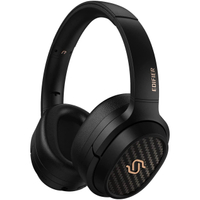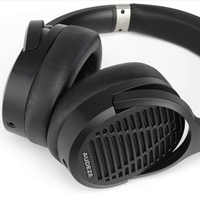The Fiio FT5 strike a really nice balance in every respect, from the way they’re built and finished to the way they sound. If it’s absolute sonic neutrality you’re after, they may not be for you – but if you fancy an entertaining sound with a bit of audiophile credibility thrown in, give them an immediate listen.
Pros
- +
Open and entertaining sound
- +
Properly made from nice materials
- +
Good specification
Cons
- –
Won’t fit smaller heads
- –
Fractionally rich tonality
- –
Carry-case is massive
Why you can trust TechRadar We spend hours testing every product or service we review, so you can be sure you’re buying the best. Find out more about how we test.
Fiio FT5: Two-minute review
Having established itself where desktop and digital audio in particular is concerned, Fiio fancies a bit of the burgeoning headphones market. And with its new FT5, it’s delivered a pair of big, boldly designed and aggressively priced planar magnetic over-ears that will cruise into our best wired headphones buying guide with ease.
This may not be the most congested area of the headphones market, but it’s strongly contested by some well-regarded specialists such as Audeze, Grado and HiFiMan. So Fiio has given the FT5 the best possible chance by specifying upmarket materials and expensive components, by giving them plenty of connectivity options, and by voicing them to sound energetic and revealing.
All of which has worked a treat. The FT5 may not be the last word in out-and-out fidelity, but they’re a detailed and revealing listen nevertheless – and they are, in the least pejorative sense possible, fun to listen to. The sound they make is entertaining, yes, but it’s far from juvenile.
So if you want to check out what ‘audiophile’ might mean without a) getting all po-faced about it, and b) spending an arm and a leg, there’s another pair of open-backed over-ear planar magnetic headphones to add to your shortlist.
Fiio FT5 review: Price & release date
- Released on December 1, 2023
- Priced $449 / £429 / AU$799
The Fiio FT5 open-backed planar magnetic over-ear headphones have been on sale since the start of last December, and they’ll typically set you back $449, £429 or AU$799 depending on where you’re shopping.
There are plenty of open-backed over-ear headphones available at this sort of money, of course (including Fiio’s own open-backed Fiio FT3 headphones, which arrived in May 2023, priced $299 / £289 / AU$449) – but when you take into account the planar magnetic drivers the FT5 deploy, your choice suddenly becomes quite a lot less numerous.
That doesn’t mean the FiiO are without competition, though…
Fiio FT5 review: Specs
Swipe to scroll horizontally
| Drivers | 90mm planar magnetic |
| Active noise cancellation | No |
| Impedance | 36 Ohms nominal |
| Weight | 456g (without cable) |
| Connectivity | 3.5mm; 4.4mm; 6.3mm; 4-pin XLR |
| Frequency response | 7Hz – 40kHz |
| Cable length | 1.5m silver-plated monocrystalline copper |
Fiio FT5 review: Features
- 90mm planar magnetic drivers
- Multiple connectivity options
- Choice of earpad materials
The headline here, of course, are the big (90mm) planar magnetic drivers the FT5 use to deliver sound to your ears. While the more pragmatic dynamic driver alternative is far more prevalent at this sort of money, planar magnetic technology is not unheard of – and Fiio has decided it’s the best way to achieve its ambition of “intense energy like a thunderstorm”.
So each earcup features a large, extraordinarily thin (6µm) planar magnetic driver, backed by 11 neodymium magnets on one side and nine on the other). Fiio reckons this arrangement is good for a frequency response of 7Hz – 40kHz, but has an easy-to-drive (and most un-planar-like) sensitivity of 96dB/mW @1kHz.
The FT5 are supplied with 1.5m of braided silver-plated monocrystalline copper. One end splits into a pair of 3.5mm terminations, one to attach to each earcup. The other end features a number of easily swappable connections: 3.5mm, 4.4mm and 6.3mm jacks, and a 4-pin XLR. So you’ve both balanced and unbalanced options, and should be able to connect to your preferred source equipment without any trouble.
To offer further adaptability, the Fiio are supplied with a couple of pairs of earpads – one pair is made of suede, the other of protein leather. Swapping between the two is simple, and Fiio’s claims for the sonic differences between the two are quite something: suede earpads are supposedly “magnificently vigorous” while the protein leather alternative is “highly detailed”. Both of which sound pretty enticing, I’m sure you’ll agree.
- Features score: 5/5
Fiio FT5 review: Sound quality
- Open and spacious in every circumstance
- Detailed, positive and (mostly) naturalistic sound
- Entertaining and analytical in equal measure
Some headphones reveal their talent expertise over time, giving you a bigger taste of their character with each listen. The Fiio FT5 aren’t like that – they give you everything they’ve got immediately, in full, and with no apparent filter.
No matter if it’s a big 24bit/192kHz FLAC file of David Bowie’s Sound and Vision via an expensive headphone amp, a 320kbps MP3 of Sprinter by Torres via a laptop’s 3.5mm output or a vinyl copy of the record by boygenius coming from the headphone socket of the amplifier the turntable’s connected to, the FT5 are an open, revealing and nicely balanced listen. They’re able to extract and contextualise the finest details, but they manage to be engaged and entertaining at the same time. They’re always on the front foot, are always able to give rhythms and tempos decent expression, and they always let a vocalist sound positive, characterful and direct.
Tonally, the Fiio are on the ‘fractionally warm’ side of ‘neutral’, but it’s such a mild hint of heat that it’s more of a trait than a flaw. Their frequency response is not absolutely flat – there’s a little bulge around the midrange that pushes singers (and all other midrange information) forwards just a little – but, again, this is a characteristic rather than a shortcoming.
Treble sounds are bright and textured, but substantial at the same time. At the opposite end of the frequency range, there’s similar richness to bass sounds – but, again, more than enough detail and variation. Control of the bottom end is confident, so there’s momentum and well as substantial underpinnings to recordings. Dynamic headroom for the big shifts in volume and/or intensity is more than adequate, and the Fiio handle the more fleeting dynamics of harmonic variation in the same assured manner.
The soundstage the FT5 create is big, organised and properly defined, with both the front/back and left/right planes properly represented. There’s plenty of elbow-room available even in quite congested or complex recordings, and the Fiio don’t deviate from this even if you decide to listen at big levels – there’s no crowding or flattening, just more volume.
Naturally, the better-recorded the music in the first place, the higher the resolution of the storage format and the better the source electronics, the happier the FT5 are. But even if they’re playing compressed digital audio files directly from the (inevitably hopeless) headphone socket of a computer, the Fiio are prepared to make the best of it. And above all, they’re a musical, energetic and enjoyable listen.
- Sound quality score: 4.5/5
Fiio FT5 review: Design
- Magnesium aluminium alloy construction
- Leather carry-case
- Dual-band hangar
At 456g (without cables) the FT5 are far from the lightest headphones around. But it could be worse – the magnesium aluminium allow from which they’re almost entirely constructed is around two-thirds as dense as aluminium alloy – and the dual-band hangar arrangement, which features a slim leather headband inside some alloy suspension, distributes that weight so efficiently that the FT5 feel like no kind of burden to wear.
The pattern on the rear of the earcups is decorative, sure, but it also fulfils a specific function. It’s designed to control and accelerate the airflow generated when the big planar magnetic driver is moving, which has no end of acoustic benefits where soundstaging and high-frequency response is concerned. And the earcups themselves move through three axes, which means that all but the most unusual head-shapes should have no problem getting comfortable inside a pair of FT5.
To keep the headphones’ finish looking clean and tidy, Fiio provides a rigid, luxurious-in-a-tan-leather-kind-of-way, really quite large carry case which will take up a big chunk of your hand-luggage allowance. It’s got a space for all the different connections, and a retractable carry-handle. Like the headphones themselves, the case is rather more up-market in look and feel than seems likely at the asking price.
- Design score: 5/5
Fiio FT5 review: Value
- Balanced, convincing sound
- Great standard of build and finish
- Impressive specification
If you’ve read this far, you know the Fiio FT5 hold a nap hand. They sound great, they’re built to last from tactile and hard-wearing materials, and they have an audiophile specification at a mainstream price. All of which means they represent very acceptable value indeed.
- Value score: 5/5
Should I buy the Fiio FT5?
Swipe to scroll horizontally
| Section | Notes | Score |
|---|---|---|
| Features | 90mm planar magnetic, open-backed cans with a plethora of connectivity options | 5/5 |
| Sound quality | Open, spacious, detailed, positive and (largely) natural | 4.5/5 |
| Design | Far more premium-feel than the ticket price suggests | 5/5 |
| Value | Classy build and finish with sound that sets a new bar at this level | 5/5 |
Buy them if…
You’re a headphones geek
Planar magnetic technology is the choice of the audiophile, more often than not – but it tends to cost a fair bit more than this
You have a few sources of music
Fiio provides four different connections with the FT5, so you should no problem hooking up to your favourite music player(s)
You’re often out and about
The leather carry-case provided by Fiio will make sure your FT5 stay looking spiffy even if you’re usually a bit careless with your possessions



